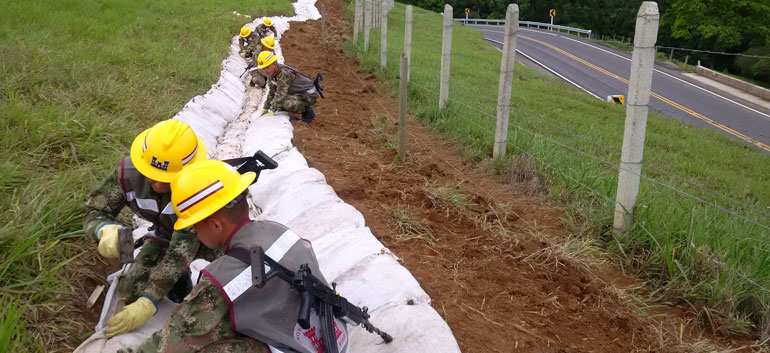Economic development operations carried out by the Colombian military put communities in great risk for their lives, according to both local authorities and Washington think tank WOLA.
A 2,500 man task force headed by General Ruben Dario Alzate began operations in the western state of Choco in January, in coordination with a national campaign to weaken FARC strongholds, with the purpose of committing 60% of its funds to much-needed community development and humanitarian projects in the area.
However, a history of military operations in the embattled region of western Colombia proves that the presence of state security forces makes things worse, not better, for communities, even when the projects involve building social infrastructure such as schools.
The present risk lies in civilians being misidentified by illegal armed groups as informants or helping the military, said Gimena Sanchez, leading Colombia human rights advocate at the Washington Office on Latin America (WOLA).
“Having just been in Choco in March, it is very apparent that the mixing of military assistance with economic assistance is something that puts the communities at risk, and its something that we’ve heard from all the groups we work with there,” Sanchez told Colombia Reports.
“In December there was a bombing precisely because there was military presence in an urban setting. We think this puts the civilian population in a very complicated situation where they’re continually being stigmatized by one side or the other,” said the human rights advocate.
Following the December bombing, FARC forcibly rounded up residents and announced that they would destroy the whole village if the community “allowed” the military to enter the area again.
Choco has become one of the worst areas in the country for clashes between guerrillas and other armed groups including FARC, ELN, Los Rastrajos, and Los Urabeños, all of whom struggle for control over mobilization routes, drug and arms trafficking, and extortion.
Paramilitary violence has only increased in areas where the military has pushed FARC back, according to the Ideas for Peace Foundation, and the national ombudsman warns that these same groups are gaining ground nationwide.
MORE: Colombia’s ombudsman warns of neo-paramilitary expansion
On Tuesday, peasant and indigenous community associations along with the local diocese issued a plea for the protection of civilians.
“We ask the security forces, in fulfilling its duty, to ensure the protection of communities, and at this crucial juncture, not to endanger the lives and property of the residents of the region,” the Church said.
“We reiterate our rejection of the military implementation of social investment projects in our communities, under the framework of the Choco Strategic Agenda 2038, since according to the constitution and the law, this is the specific task of decentralized local and regional authorities, ministries, and institutes.”
According to a report following a WOLA visit to Choco in March, the humanitarian and security situation facing residents in rural areas has deteriorated significantly. Updated statistics on the Colombian conflict showed earlier this month that more than two thirds of the inhabitants have been victimized by one of the armed actors active in the region.
MORE: Number Of Victims Of Colombia’s Conflict Surpasses 7 Million
Says WOLA, residents are “trapped between guerrillas who want them to stop the armed forces from entering or having a presence in their communities—which is an impossible thing to ask of them—and an army who sees any civilian who asks that they remain stationed on the perimeters of their villages under suspicion of being a potential guerrilla member.”
Sources
- Llamado a una solución humanitaria a la crisis provocadapor la retención del General Alzate (communique)
- Interview with Gimena Sanchez
- Discussion on the advances in the Restitution and Reestablishment of Territorial Rights for Indigenous, Afro-Colombian, Raizal and Palenquera Communities (Gimena Sanchez)


